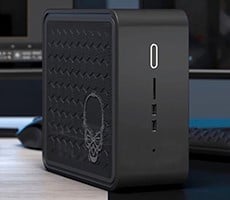Alienware Aurora R8 Review: A Compact RTX Gaming Powerhouse
|
|
|
The benchmark uses tessellation, ambient occlusion, volume illumination, and a high-quality depth of field filter. We tested the Alienware Aurora R8 on the Extreme preset and compared it to an array of systems on our database.



The Aurora R8 performs well in Fire Strike Extreme, but is not quite able to overtake the GeForce GTX 1080 Ti in the Area-51 Threadripper system. The system is able to drive 60fps in the first graphics test, though the more punishing second round brings a merely "acceptable" 45fps average. The overclocking profile pushes modest gains across all tests.
|
3DMark Time Spy is a synthetic DirectX benchmark test from Futuremark. It features a DirectX 12 engine built from the ground up to support bleeding-edge features like asynchronous compute, explicit multi-adapter, and multithreading. Time Spy is designed to test the DirectX 12 performance of the latest graphics cards using a variety of techniques and varied visual sequences. This benchmark was developed with input from AMD, Intel, Microsoft, NVIDIA, and the other members of the Futuremark Benchmark Development Program, to showcase the performance and visual potential of graphics cards and other system resources driven by close-to-the-metal, low-overhead APIs.


We do not have any full systems to compare the Aurora R8 to just yet in this test, so we are including our GPU test bench figures for reference. At stock speeds, the Aurora R8 lags behind the Titan Xp for the overall score, but still bests it for graphical performance. Our test bench commands Intel's finest processor, the Core i9-9980XE, which costs around $2000 on its own.
Once overclocked, the Aurora R8 edges out the test bench RTX 2080 in the graphics test. Clearly, the Aurora R8's more mainstream hardware is still up to the task.
|
Monolith’s surprisingly fun Orc-slaying title delivers a ton of visual fidelity even at the lowest quality settings. So, to maximize eye candy while also heavily taxing the cards, we ran the game's built in benchmark with its Ultra quality settings at a couple of resolutions, topping out at 4K on these tricked-out dragster gaming PCs.


For 1080p and 1440p, the Aurora R8 claims the best single-GPU framerate on the chart. The Core i7-9700K's fast clocks really help out at these lower resolutions. By 4K, the workload is primarily GPU-bound and the Area-51 Threadripper bearing a GeForce GTX 1080 Ti is able to surpass it.
Now we will ramp up the visuals like only Turing GPUs currently can and step through some ray-tracing benchmarks...







